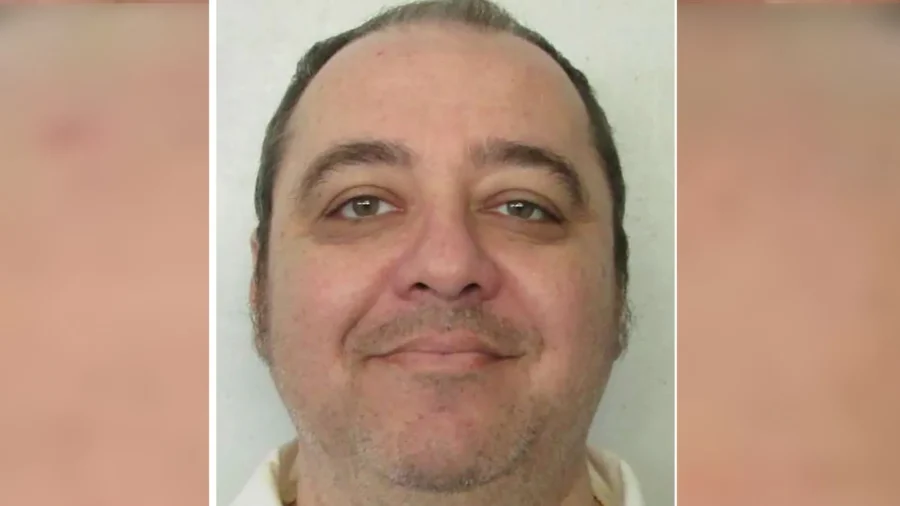The Supreme Court of Alabama is weighing whether to allow the state to become the first to execute a prisoner with a novel method: asphyxiation using nitrogen gas.
Last month, Alabama Attorney General Steve Marshall asked the court to allow the state to proceed with gassing Kenneth Smith, who was convicted of murder in 1996, using a face mask connected to a cylinder of nitrogen intended to deprive him of oxygen.
Mr. Smith’s lawyers have said the untested protocol may violate the U.S. Constitution’s ban on “cruel and unusual punishments,” and have argued a second attempt to execute him by any method is unconstitutional.
In a reply brief filed with the court on Friday, they called the nitrogen gas protocol “so heavily redacted that it is unintelligible,” and said Mr. Smith had not yet exhausted his appeals.
“The State’s attempt to bump Mr. Smith to the head of the line is a transparent means to avoid discovery into its execution procedures in a federal proceeding that Mr. Smith commenced more than one year ago,” they wrote.
Death penalty experts also say the state has not provided enough information about how it will mitigate the danger to execution officials and others of using an invisible, odorless gas inside the death chamber.
Mr. Smith, 58, is one of only two people alive in the U.S. to have survived an execution attempt after Alabama botched his previously scheduled execution by lethal injection in November when multiple attempts to insert an intravenous line into a vein failed.
Most executions in the U.S. use lethal injections of a barbiturate, but the decades-old method has become more challenging in recent years.
Some states have struggled to obtain the needed drugs as pharmaceutical companies refuse to sell them to prison systems. Autopsies have found the lungs of people executed by lethal injection filled with frothed bloody fluids, which opponents of the punishment say shows they suffered the sensation of drowning before they died.
In seeking the death warrant, the attorney general’s office released a heavily redacted version of the Alabama Department of Corrections’ new gassing protocol, which it refers to as “nitrogen hypoxia.”
In the gas chambers used in earlier executions by U.S. states, poisonous gases such as hydrogen cyanide were used to kill. Nitrogen, however, is not poisonous, making up about 78 percent of breathable air. In Alabama’s proposed method, which lawmakers approved in 2018, it is intended to displace the oxygen being inhaled by the condemned person.
Oklahoma and Mississippi have also approved nitrogen asphyxiation executions, but have yet to try the method.
The unredacted portions of Alabama’s protocol indicate Mr. Smith would be placed on a gurney and a mask would be strapped on his face. Many details about the new apparatus remain unclear, but the mask has both an inflow tube attached to it and an outflow mechanism for exhaled breaths.
Dr. Joel Zivot, an anesthesiologist at the Emory School of Medicine who has been an expert witness in challenges to execution protocols, said it is difficult enough for doctors to maintain an airtight seal when applying a mask to an unconscious patient, and it is unclear how Alabama is addressing this issue in using a mask on a conscious, possibly uncooperative prisoner.
“It’s clear to me that they don’t know what they’re doing,” Mr. Zivot said. “If there’s any air that gets in underneath mask then they’re not going to die.” Someone who is temporarily starved of oxygen but does not die risks severe injury to the brain and other organs.
Officials at the attorney general’s office did not respond to queries. The Department of Corrections said it would not provide any “additional information” beyond that contained in the redacted protocol released last month.
The published protocol does not say how Alabama will prevent pressurized nitrogen gas, which will run through the mask for at least 15 minutes, from leaking into the execution chamber and surrounding rooms, endangering others present.
The state has said it will have oxygen-level meters in the execution chamber that will sound an alarm if levels fall too low.
It will also require the condemned person’s spiritual adviser to sign a form acknowledging the risk of “inert-gas asphyxiation” and agreeing to remain at least three feet (0.91 m) away from the mask and the outflow.


